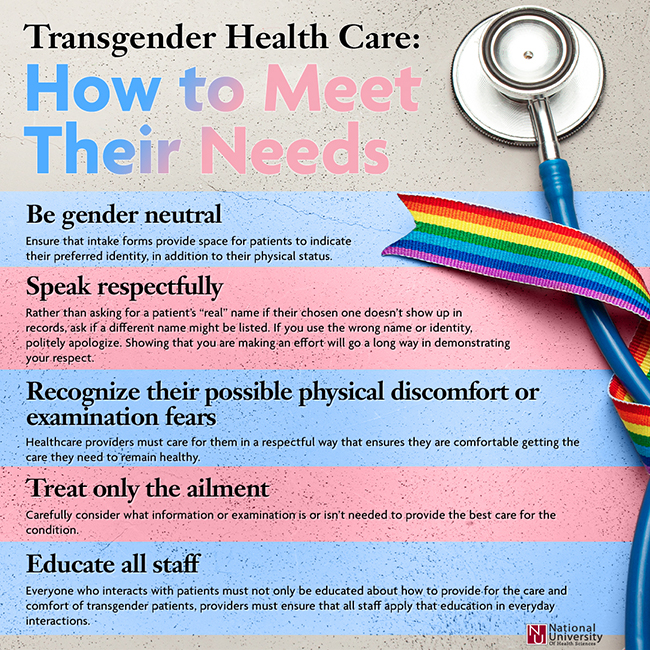Going to the doctor or dentist is stressful for many people, but it carries even more anxiety for transgender patients who are often mistreated or denied care. Seventy percent of transgender and gender-nonconforming survey respondents reported experiencing one or more of the following:
- Being refused needed care
- Health care professionals refusing to touch patients or using excessive precautions
- Health care professionals using harsh or abusive language
- Being blamed for one’s health status
- Health care professionals being physically rough or abusive
Additional surveys reveal that transgender health care discrimination keeps nearly one-third of transgender patients from seeking medical help for illness or injury. Especially startling is that many say they’ve had to educate their doctors about transgender health care.
Transgender Health Care Discrimination
The Institute of Medicine defines transgender as “a person who feels that their gender identity does not match their physical body and differs from the gender that others observed and gave them at birth (assigned or birth gender).” According to a 2016 data analysis by The Williams Institute, about 1.4 million American identify as transgender.
From concerns about office staff betraying their transitional status to others, to discrimination in the care they receive, transgender individuals are beginning to speak out about what medical professionals can and should do to ensure that they feel safe in their care. Without awareness and education on the part of health care providers, these issues are likely to escalate with the growing transgender population.
What Health Care Practitioners Can (and Should) Do
Emma Vosicky and Jaime Pagano pulled no punches when they addressed students and faculty at a National University of Health Sciences (NUHS) Pride Medical Alliance club (PMA) meeting in March 2019. From worrying about how they would be treated by office staff to fearing betrayal by those who might share their information, the transgender speakers discussed the challenges beyond their physical transformations that they and others face when seeking medical care.
Vosicky discussed the necessity to “out” herself to medical professionals when they asked about medications taken or previous medical history that did not match her appearance. The speakers suggested that health care providers consider ways they can let their clients or patients know that they are non-discriminatory. Pagano said he feels safer when he sees an intake form that includes options such as gender non-conforming, non-binary, trans-female and trans-male, in addition to male and female. He said it helps to feel that the provider he’s seeing is aware and cognizant that we are not living in a male/female only world. He also feels more confident that the provider will be more clinically aware of his needs.
NUHS faculty member Jamine Blesoff, ND, who has worked with transgender youth, stressed that it is vital for physicians to ensure that their patients care for their whole selves as they physically are at each stage of their transitions. “We still must provide PAP tests for men who are transitioning from being female, and prostate exams for pre-surgical women,” Dr. Blesoff noted, expressing concern that there are some doctors who won’t provide that type of service.
Transgender Access to Health Care
In addition to the universal requirement to adhere to HIPAA laws, here are suggestions for health care practitioners to ensure that their transgender patients are treated with dignity, respect and, above all, ensuring that they receive the medical care they need.

Be gender neutral: Building trust begins when any patient walks in the door. Ensure that intake forms provide space for patients to indicate their preferred identity, in addition to their physical status. Ask what pronouns they prefer, such as he/she/they, and use them.
Speak respectfully: Rather than asking for a patient’s “real” name if their chosen one doesn’t show up in records, ask if a different name might be listed. If you use the wrong name or identity, politely apologize. This may be challenging with a long-time patient, but showing that you are making an effort will go a long way in demonstrating your respect. “I always believe that intent matters more than words,” said Sam Brinton a gender-fluid bisexual activist who is Head of Advocacy and Government Affairs at The Trevor Project. “There’s a difference between ‘I can’t’ and ‘I’m trying.’ If your intent is to hurt me by not using my pronouns, that matters more than any words that you say.”
Recognize their possible physical discomfort or examination fears: “For some transgender patients, it may be a source of shame and physical discomfort to have to continue to have procedures that don’t match their identity,” Dr. Blesoff explained. “Healthcare providers must care for them in a respectful way that ensures they are comfortable getting the care they need to remain healthy.”
Treat only the ailment: When providing basic medical care, such as for a broken arm, a person’s gender identity is often irrelevant. Carefully consider what information or examination is or isn’t needed to provide the best care for the condition.
Educate all staff: Everyone who interacts with patients must not only be educated about how to provide for the care and comfort of transgender patients, providers must ensure that all staff apply that education in everyday interactions.
“I try to work as an ally to transgender patients,” Dr. Blesoff said. “Working with patients from all different identities and backgrounds helps inform my practice to be as culturally sensitive as possible, which helps me provide the best care possible to all patients,” she added. “Having that cultural humility is important for those of us who are as we look in the world.”
{{cta(‘400c8601-fa16-4f8d-b424-5974870e3634’)}}




0 Comments